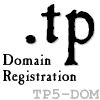
.tp was the listed Internet country code top-level domain (ccTLD) for East Timor. The letters refer to Timor Português or Portuguese Timor, the name of the present independent nation when it was an overseas territory of Portugal. The domain .tp was officially launched in December 1997 by connect.ie, an internet service provider based in Dublin, Ireland, in cooperation with the East Timorese authorities in absentia, while East Timor was under Indonesian authority.
Political repression is the act of a state entity controlling a citizenry by force for political reasons, particularly for the purpose of restricting or preventing the citizenry's ability to take part in the political life of a society, thereby reducing their standing among their fellow citizens. Repression tactics target the citizenry who are most likely to challenge the political ideology of the state in order for the government to remain in control. In autocracies, the use of political repression is to prevent anti-regime support and mobilization. It is often manifested through policies such as human rights violations, surveillance abuse, police brutality, imprisonment, involuntary settlement, stripping of citizen's rights, lustration, and violent action or terror such as the murder, summary executions, torture, forced disappearance, and other extrajudicial punishment of political activists, dissidents, or general population. Direct repression tactics are those targeting specific actors who become aware of the harm done to them while covert tactics rely on the threat of citizenry being caught. The effectiveness of the tactics differ: covert repression tactics cause dissidents to use less detectable opposition tactics while direct repression allows citizenry to witness and react to the repression. Political repression can also be reinforced by means outside of written policy, such as by public and private media ownership and by self-censorship within the public.
The Ministry for Seniors and Accessibility, is the ministry responsible for issues relating to seniors and persons with disabilities in the Canadian province of Ontario.
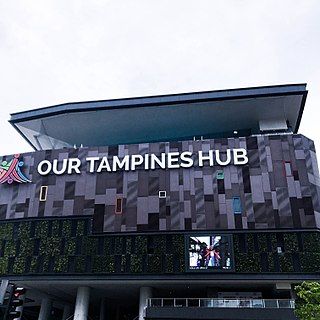
Our Tampines Hub is an integrated community and lifestyle building in Tampines, Singapore. It is located on the grounds of the former Tampines Stadium and Tampines Sports Hall and is part of the development of the Tampines Regional Centre.

Human rights in Singapore refers to rights both legal and in practice. Since Singapore's independence in 1965, the legal rights of its citizens have been set out in the Constitution of Singapore and include rights found in subsequent amendments and referendums. These rights have evolved through Singapore's history as a part of the Straits Settlements, its years under Japanese occupation, its position as a separate self-governing crown colony, and its present day status as a sovereign island country and city-state.
The Ministry of Personnel, Public Grievances and Pensions is a ministry of the Government of India in personnel matters specially issues concerning recruitment, training, career development, staff welfare as well as the post-retirement dispensation.
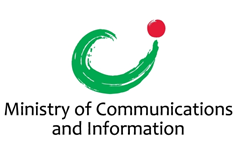
The Ministry of Digital Development and Information is a ministry of the Government of Singapore responsible for overseeing the development of the infocomm technology, media and design sectors, as well as the government's information and public communication policies. It is also responsible for maintaining the national library, national archives and public libraries.

The Agri-Food and Veterinary Authority of Singapore (AVA) was a statutory board under the Ministry of National Development that regulated food safety, safeguarded animal and plant health, and facilitated the agri-food and fisheries trade sectors. AVA was disbanded on 1 April 2019, with duties being transferred to other statutory boards, Singapore Food Agency, National Environment Agency, Health Sciences Authority, and National Parks Board.

Science policy in Malaysia is regulated by the Ministry of Science, Technology, and Innovation. The ministry focuses on five areas: biotechnology, ICT policy, industry, sea to space and core science and technology. Other ministries, such as the Ministry of Agriculture and the Ministry of Health also have science departments. Training in scientific areas was promoted during the 1970s and 1980s. From 1987 to 1997 research and development used 0.24% of GNP, and in 1998 high-tech exports made up 54% of Malaysia's manufactured exports.
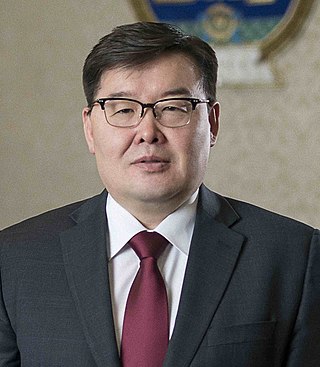
Gombojav Zandanshatar is a Mongolian politician. He is a member of the Mongolian People's Party, and served as Party General Secretary from 2012 to 2013. Zandanshatar currently serves as Mongolian President's chief of staff.

Robertson Quay is a wharf near the source of the Singapore River. It is the largest and most upstream of the three wharfs on the river and is named after a municipal counsellor Dr J Murray Robertson. It now has al fresco dining as well as arts and culture.

The Ministry of Health, commonly abbreviated to MoH, is the ministry overseeing the health care and health policy of Saudi Arabia. The ministry is tasked with formulating strategies to ensure public health in the country, while also managing crucial health infrastructure.

The Ministry of Social and Family Development is a ministry of the Government of Singapore responsible for the formulation and implementation of policies related to the community infrastructure, programmes and services in Singapore.
Ayappakkam is a Western suburb of Chennai in Thiruvallur district in the Indian state of Tamil Nadu. Ayapakkam is currently a village panchayat surrounded by Thiruverkadu municipality, Avadi corporation and Greater Chennai Corporations.

Ghana Open Data Initiative (GODI) was started in January 2012 by the National Information Technology Agency (NITA) in partnership with the Web Foundation (WF), to make Government of Ghana data available to the public for re-use. The establishment of GODI is meant to promote efficiency, transparency and accountability in governance as well as to facilitate economic growth by means of the creation of Mobile and Web applications for the Ghanaian and world markets. The project was scheduled for completion in 2014 and aimed to create a sustainable Open Data ecosystem for Ghana. GODI was launched with a 100 data sets categorized as political, legal, organizational, technical, social or economic. The vision of GODI is to develop an open data community involving the Government of Ghana, civil society organizations, industry, developer communities, academia, media practitioners, and the citizenry, to interact with one another with the aim of developing an open data portal to bring about transparency, accountability and efficiency in government.
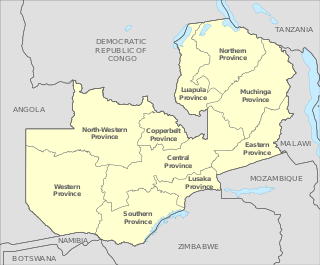
Mass media in Zambia consist of several different types of communications media: television, radio, cinema, newspapers, magazines, and Internet-based Web sites. The Ministry of Information, Broadcasting Services and Tourism is in charge of the Zambian News Agency which was founded in 1969. Due to the decolonization of the country, it ultimately allowed the media sector of the country to flourish, and enabled the establishment of multiple different new outlets, as well as established a new news consumption culture that wasn't previously known to Zambia. Furthermore, due to the short-wave capabilities, and international increase in production, demand, and sales of the transistor-radios in the country it made it increasingly more difficult to control the media outlets throughout Zambia by the leaders of the government.

The Ministry of Labour, Employment and Social Security is a government ministry of Nepal that governs the development policies of labour and employment in the country. Sharat Singh Bhandari is newly appointed as a minister.
The COVID-19 pandemic in Oman was a part of the worldwide pandemic of coronavirus disease 2019 caused by severe acute respiratory syndrome coronavirus 2. The virus was confirmed to have reached Oman on 24 February 2020 when two citizens tested positive for COVID-19 after returning from Iran. As of 21 August 2021, the total number of cases registered in the sultanate is 300,914, of which 289,450 have recovered and 4,020 have died. Initially, the majority of the cases and deaths occurred in the expatriate community. By July 2020, as the pandemic entered its fourth month in the country, the majority of the cases and deaths had occurred among the citizens.

The COVID-19 pandemic in Montserrat was a part of the ongoing global viral pandemic of coronavirus disease 2019 (COVID-19), which was confirmed to have reached the British Overseas Territory of Montserrat on 17 March 2020. The first death occurred on 24 April 2020. By 15 May, all patients had recovered. On 10 July, a new case was discovered. On 7 August, there were no more active cases.
The COVID-19 pandemic was confirmed to have reached Transnistria in March 2020.














